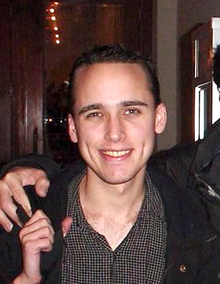
This is Bradley Manning. He worked for the army and, specifically, military intelligence in the US. His background and biography are described in beautiful detail by the Channel 4 News website. Suffice to say, he ticks most of the boxes for being a prototypical geek. He was bullied at school, he felt like an outsider, he was awkwardly emotional, he worked in software development and he even produced an earlier prototype for social networking websites. As you can see from these logs, in his chats with former hacker Adrian Lamo, here was a man painfully aware of how the world worked and how information was suppressed to make it work for an elite minority. It was Lamo, incidentally, that tipped the FBI off to get Manning arrested. This was after Manning admitted to releasing the US embassy cables to Julian Assange and Wikileaks. It is said that the US military authorities want to lock him up for fifty-two years, even though they have him detained in appalling conditions with no formal conviction yet.
This is Adrian Lamo. Unlike Manning, he was probably more of a joyful joker, although as usual, personalities as complex as his deserve more than a two word synopsis. His background, however, is of a loner geek and of a wandering nomad and couch-surfer. There's two things that these chaps have in common. The first is that the US authorities wanted them punished severely, to the point of it being seriously disproportional to the original crime. The second is that they're both geeks, albeit of differing personalities. Lamo is now in danger of being seen as the devil in this, with Bradley Manning seen as his victim. Perhaps that's the point. Lamo had always seen himself as curiously dispensable. When Lamo himself was asked if he was afraid of going to jail over hacking the New York Times in 2004, Lamo said simply, "I'm sure it would be educational. The beautiful thing about the universe is that nothing goes to waste". Maybe that's just as well. If it hadn't been for Lamo, Manning could've been forgotten about. Maybe Lamo remembered the plea bargain over his own hack and hoped Manning would've been treated similarly. Or maybe, since we now know he's been diagnosed with Asperger's Syndrome, he viewed the world as a simple game of trade-offs, rather like a Prisoner's Dilemma conundrum.

Someone who definitely wasn't forgotten about by the US authorities is this man. This is Gary McKinnon. I don't have to carry on the recurring theme here, but, hey, here we go again. He's a computer programmer. He has also been diagnosed with Asperger's Syndrome, which is a condition that makes him a geek par excellence, rather like Lamo. He was a security hacker that found unprotected information on military machines, several years before Bradley Manning did the same thing. Since 2001, the US government have done everything but forget about him, while the Bin Laden "issue" has been shunted away into the background. But they've pursued McKinnon relentlessly and, similar to Lamo, they scrabbled around for ages for a law that they could prosecute him for until they retrospectively used the UK 2003 Extradition Act to do it. Gary found a bit of information hidden behind an opened safe door that some meathead had forgotten to lock and that was just the worst embarrassment.
The American authorities have form for this sort of thing, as you can see. It's all about the stunted adolescence they've been stuck in since the American teenage dream. Bin Laden can best be described as the hypothetical Hell's Angel friend that the American football jock drank with at the same college bar. It suited them both to be seen drinking together. Once they'd both knocked others' heads together a few times, the Hell's Angel friend got inebriated one night and ended up beating up some of the jock's friends. For a while, the jock made a pretence at going after the Hells Angel biker, but slowly decided he wasn't worth it. He'd got enough out of the friendship and was quite happy to see the back of him and to forget about him. The hypothetical nerd character is a more difficult thing for this hypothetical football jock to get his head around. This was the kid that the jock picked on at school. It's more world-shattering to be humiliated by the nerd, than to be occasionally pummelled by the Hell's Angel. This geek did something more taxing to the US jock than the Hell's Angel; this geek found the jock's diary carelessly unguarded in his desk. Worse than that, the diary contained all the details about the jock cheating at exams, bullying other children, stealing pocket money off other kids and so on. What's an information-obsessed geek to do?
I'm a software developer. I'm currently building a couple of web projects around something called RESTful architecture. From a purely technological view, it's an architecture that suits the social web (as it currently stands). Such an architecture makes every web address a proper repository of data that can be shared by humans, browsers, devices and mobile phones. Every web address is an information resource and this is the original way I was taught about how the embryo World Wide Web worked as a student. Such an architecture has no sense of ideology behind it. It is there to share information openly and that's it. It's the most efficient solution and my next major (non-political) web projects will be built like this. The only difference between now, and when I was a student, is how easy I can make that information flow, with the sheer amount of reusable open source components available. For many web developers, this is an extremely exciting time, as we like to build and make things that share information.
There were constructive reasons why computer science metamorphosed into software engineering. There were networking reasons why software engineering turned into information technology. There were sociological and economic reasons why information technology became communications technology. In most places on this planet, information and communication are available at the touch of a button on a neutral net that doesn't have a political agenda. Instead of bullying and intimidating geeks, the bar-hogging American ex-jock is going to have to get used to the fact that this isn't his world anymore.
